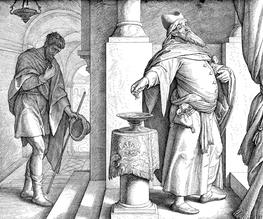 If you offer mercy and care to the poor so you are seen by others for their applause, for your own glory, honor, status . . . if you pray in ways so you may be seen and admired by others . . . if you fast to be recognized and esteemed by others, you are a hypocrite like the others. And, so, you are, then, not poor in spirit, not one who mourns, not meek and you do not thirst and hunger for justice, nor are you merciful, nor clean of heart, nor a peace-maker, thus, you will not receive reward from the Father who is in heaven. The kingdom is not yours. You shall not be comforted. You shall not inherent the earth. You will not be satisfied. You shall not receive mercy. You shall not see God. And, you will not be called “sons of God.” Seeking the applause of others for caring for the needy and seeking to be seen praying and fasting by others most certainly means you will not be persecuted for righteousness’ sake. Neither will you be reviled, and rather than having all kinds of evil uttered against you, you will be lauded with accolades and honor and status, and, therefore, you will not receive God’s gracious heavenly rewards, for you will have already received your reward. You are “shining” so others will give you glory rather than give God glory. And, in the end, you will not be able to claim that you have been cheated, for you will have been paid in full by the glory (applause, recognition, honor, status) given to you by others.
0 Comments
The salt, light, and city imagery should be read in light of or as flowing from the Beatitudes (Matthew 5:3-12). Verses 11–12 are certainly a bridge, making a pivot from the general invitation nature of the Beatitudes to the church directed “you are” subjects in vv. 12-16. Yet, what penetrating flavor? What light is to shine? What kind of City on a Hill? The reference to doing “good works” in verse 16, at a minimum, implies the good and counter-cultural and contra-social/societal flourishing that flow from the Beatitudes. Salt and light that indicate that the poor in spirit (by now should should know this means the actual poor), those who mourn (i.e., those lacking resources), and the meek (i.e., the powerless of the earth) have the kingdom, are comforted, and inherit the earth; light that illumines from a City where the desire for God’s justice is thirsted for and hungered for; where mercy prevails, the unclean are welcomed, and filled with peacemaking sons of God. The content and polity (if you will) of the City on a Hill (which I do take as church, bytheway) is the Beatitudes. And, if you (we, that is a church) actually lives under this constitution of Beatitudes, remember, “Blessed are those who are persecuted” for persecution will come for these social-upheaving Beatitudes are not naturally welcomed nor accepted by the powers (i.e., the powerful and those in power); and, remember, you are blessed “when others revile you and persecute you and utter all kinds of evil against you falsely” for power (the powerful and those in power) do not want a City like this. But “rejoice and be glad, for your reward is great in heaven, for so they persecuted the prophets [i.e., those who foresaw this City on a Hill, the king of this City, and this time of Beatitude-flourishing] who were before you.” Jesus is the King of this City and it is the good works of the Beatitudes that will glorify our Father who is in heaven.
 So many values and virtues, which came from the appearance and presence of Christianity in the world 2,000 plus years ago, in our culture, exist today as noble and ideals amongst society, so much so that the intent of Jesus’ Blesseds are now tempered, eased, toned down, dulled, softened. Their bite taken out. Their edge taken off—so that their radical, self-righteous slaying, Christendom destroying, idol bashing, social leveling, culture reversing power is missed and dismissed by much of the church and ignored as simplistic and assumed platitudes by modern crowds. The gospel is actually missed.
We exist at a time when the Cheshire cat smile of these Beatitudes exist (in vague social and cultural forms and weak values and virtues, and, even, as political correctness); but the cat (i.e., the intent Jesus had in the first place) is all gone. These verses, Matthew 5:3-12 (above), were the most oft quoted, referred to, and referenced New Testament texts in the first 150 years of the church. They were the call (invitation) to the faith, the test of faithfulness, and the bane and annoyance of existing powers. You want to know how Christianity spread so rapidly and the church increased beyond imagination in the first 150 years--they actually believed the Beatitudes. And, did them. The early believers, mostly poor and lacking resources, small and powerless and often hidden, lived the life the Beatitudes described, endured attacks against the message they implied, and, as a result, out-lived an empire. Our problem now, is we like the smile but care not the cat has disappeared. We've turned much of the Beatitudes 180° degrees from their original intent that they no longer slay us nor confront the culture (or the church) with all its social hierarchy and status, its vertical world. The Beatitudes are interpreted and used in ways so that the rich, famous, elite, the educated, the privileged and advantaged are comforted to think that they are, as well, “poor in spirit," so they get to keep their privilege and advantage (as long as they recognize their "spiritual poverty"). The privileged get to continue in the culture and social structures that gave them their advantage. Heck, theirs is the kingdom! Now and in the future. Who wouldn't want that deal? The Beatitudes are not a platform for your privilege, fame, celebrity, or power . . . they are to disturb everything that made you, that enabled you to have social status, to destroy every advantage you have had to enjoy the privileges you have . . . the Beatitudes level, they turn (for those who believe the kingdom of heaven has come) the verticalization of this social and cultural world (with all its advantages) and horizontalizes everything. If the Beatitudes don't do this to you, then you are seeing just the Cheshire cat smile. The cat is gone. 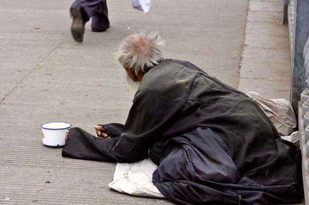 How do the rich, affluent, powerful, and wealthy break and destroy the idols that blind them and make them deaf? They accept the invitation to a kingdom, the kingdom of heaven, where the poor in spirit (the actual poor among them, the outcasts, marginal, uneducated, the sick, infirmed, and afflicted, and mentally unstable; cf. Matthew 4:24-5:1); where those who mourn for lack of recourses; and, where the meek, that is the powerless, have the kingdom, will be comforted, and shall inherit the earth. This is the kingdom to which the affluent, wealthy, and the advantaged, that is the powerful and resource-rich are invited. Of course, these lines in the list of Beatitudes are for all who seek first God’s kingdom and his righteousness. I am here focused on the powerful and resource-rich who hear this gracious invitation to the kingdom of Heaven. This is the kingdom to which the powerful and resource-rich are invited, a kingdom where they thirst and hunger for justice [yes, that’s exactly how I believe Jesus meant it]; where they will extend mercy because it is the merciful that will receive mercy; where the clean in heart make room for the unclean, because they see God; where they will be peace-makers, because they will be called Sons of God. This is an impossible invitation: for those who have been made blind and deaf and immovable because of their idols, these need the gospel, the power of God unto salvation. This is why Jesus died on that cross. This is the way in which God changed the world—really, the way in which he brought into existence, the reality of his recreated world, his kingdom of heaven. Yet, still, these words of the Beatitude are an invitation, waiting for you, through the gospel of Jesus Christ, to accept. In the end, both at our death and at the end of time, this is the kingdom that matters, the only kingdom that will remain. It is the kingdom of heaven to whom God, the Most High, will give to his saints (Daniel 7:18). This is why it makes sense that “the poor in spirit” are blessed, “because theirs is this kingdom.”
 Some more thoughts on: “Blessed are the poor in spirit, for theirs is the kingdom of heaven” (Matthew 5:3). Who are “the poor in spirit”? There is absolutely no doubt that they are, well, the poor. The context (Matthew 4:23-5:1) and the words “poor in spirit” are in the company of other objects of the “Blesseds” (i.e., the 3rd person beatitude subjects) that suggest those who are among the marginal. The phrase, “the poor in spirit,” is often turned into “everyone,” since everyone is poor in spirit, that is, we are all poor before God–you know, everyone is in spiritual poverty. Well, that simply can’t work in this text. First, it doesn’t say that. Second, that would mean Jesus meant, “Blessed is everyone since everyone is spiritually poor, for theirs (aka everyone) is the kingdom of heaven.” Nothing radical about that. Or, what's the point? And by the way, you just can’t make the text say “Blessed is everyone who recognizes they are spiritually poor . . .” either. The text simply gives no hint or translative potential for that spin. You can read into it; read back into it. But that's not what Jesus said and no exegetical fancy-foot-work (to protect and include the non-poor) can turn what Jesus said into “everyone” or “everyone who recognizes . . .” Sorry. Ain't in there to be had this way. Simply: I believe many good intentioned Christians are afraid of what it means if indeed Jesus actually said, “Blessed are the poor [the actual poor] in spirit, for theirs is the kingdom of heaven.” Yet, he did. Deal with it. Don't rob the poor of this mind blowing, culture changing, kingdom reversing, Christendom destroying, idol bashing text. And don't rob the non-poor, the rich, of the blessing that comes with realizing what kingdom God has brought about in the appearance of Jesus Christ.
It is so far easier for advantaged (aka privileged) Christians to identify, condemn, discipline, and correct sexual sins than it is idolatry and greed and covetousness (which is idolatry); for, these latter sins are harbored in our hearts and bank accounts, addresses, and processions. Note to those drawn above to “sexual immorality, impurity, passion . . .” (you know, but Paul says . . . ). These have more to do with how men treated women and little boys as a matter of attitude, class, and sexual enjoyment (i.e., “evil desire”), especially around the deipnon (or evening banquet-supper) common in Greco-Roman households of advantage. Paul is most certainly applying the gospel to the hierarchical relationships where men are at the center of everything and apt to do as they want, which did not bode well for women and children (especially young, pubescent boys). The sexual references (i.e., sexual the prohibitions, actually) were to undo such male (especially, advantaged male) proclivities assumed and, sadly, to well accepted in social relationships. This is what needed to be changed; thus, the references point to the sins of inequality, class, misogyny, pedophilia, and male pride. So . . . perhaps we simply go with what is easy to condemn, i.e., sexual sins, because the English words give us power to do so and we love our greed (idolatry) and think ourselves better than others at way too many levels than we, that is, advantaged Christians [dare I say, advantaged Christian men?] care to admit or to confess. No wonder the Beatitudes [yes, I know I am making what seems a long jump at a cross reference here, but it's a fair one] were centered (at least initially focused; cf. Matthew 5:3-5) on the poor, mourning, and meek, for Jesus (“seeing the crowds,” Mat 5:1; cf. 4:24) was turning the tables [yes, that’s a pun on the Lord’s Supper stolen and recreated from the cultural supper-banquet where such sins occurred]–turning the tables on us all. We, especially advantaged Christians, need to rethink sin and perhaps lament, confess, and repent of the idolatries that reside in our hearts and behaviors and bank accounts and addresses before we focus on the too-easy-to-condemn sexual sins of others.
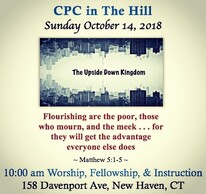 Working on the sermon for this coming Sunday morning when I noticed a dynamic parallel between the first line of the Beatitudes and Isaiah 61:1: “Blessed are the poor in spirit, for theirs is the kingdom of heaven” (Matthew 5:3). “to bring good news to the poor; he has sent me to bind up the brokenhearted” (Isaiah 61:1b) Many have noted that the Sermon on the Mount as a whole is fulfillment of or stems from the Isianic promises and in particular Isaiah 61. Matthew's Sermon on the Mount is his version of Luke's use of Isaiah 61 in Luke 4:16-19. You can see the connection between "poor in spirit" and Isaiah's parallelism of "to the poor" and "to bind up the brokenhearted."
If we turn the “poor in Spirit,” “those who mourn,” and “those who are meek” into “everyone who recognizes they are poor in spirit” and “we all mourn” and “we are all meek before God,” we rob the poor, the mourning, and the meek from the empowering words Jesus spoke. We rob the rich and powerful of the repentance and new vision of the kingdom that Jesus calls them to. We literally have taken the poor out of the “poor” and the mourning away from “those who mourn” and have turned everyone into being meek. We need to hear these beatitudes as if we are a part of that crowd (Matthew 4:23-5:3ff).
“Blessed are the poor in spirit, for theirs is the kingdom of heaven” (Matthew 5:3). 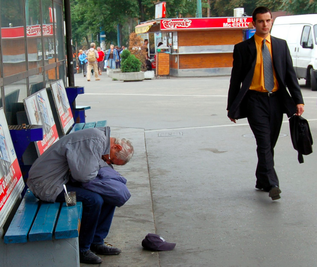 The way some Christians talk and make comments about this verse . . . you’d think that Jesus said, “Blessed are the ones who recognize their spiritual poverty and got themselves together, for theirs is the kingdom of heaven . . . “ NOT (at all)! When we teach that Jesus meant that “we are all spiritually poor” we rob both the rich (the opposite of poor) and the poor (the opposite of wealthy) of God's word to them––no one ends up “Blessed.” 1) For the one, the poor, this is a text of hope and of life, that God's got their back and that the world (this present world) isn't all it seems to be; 2) for the other, the rich, this text is an awakener (more a judgment), that they are on the wrong side of God's history. The rich are robbed of faithful discipleship when they think (and we teach them so), this text is about them. The rich-turned-follower of Jesus ought to read this text (and the remainder of the Sermon on the Mount) and ask, “How do I bring my life into alignment with the world Jesus envisions?” Not, “Phew, I get my spiritual poverty fixed, plus I get to stay rich AND inherit the kingdom of heaven.” Who wouldn't want a deal like that! Spoiler alert: the rich were the only ones to inherit anything anyway, so in some way they already had the “inheritance.” In fact, in the Greco-Roman world, the elite and wealthy were the only ones to get the world to come. Inheritance was the language of the rich, not the poor, which would have indicated how subversive Jesus' vision of the world would have been. The crowd Jesus preached his Sermon on the Mount to seems mostly made up of the crowd he was just previously ministering to in chapter 4: And he went throughout all Galilee, teaching in their synagogues and proclaiming the gospel of the kingdom and healing every disease and every affliction among the people. So his fame spread throughout all Syria, and they brought him all the sick, those afflicted with various diseases and pains, those oppressed by demons, those having seizures, and paralytics, and he healed them. And great crowds followed him from Galilee and the Decapolis, and from Jerusalem and Judea, and from beyond the Jordan . . . Seeing the crowds, he went up on the mountain, and when he sat down, his disciples came to him. And he opened his mouth and taught them, saying: “Blessed are the poor in spirit, for theirs is the kingdom of heaven . . . (Matthew 4:23-5:3). There is no doubt that both in the historical occasion (i.e., the scenes depicted in the text above) and for the "crowd” listening to Jesus' sermon, they understood to whom he was referring when he mentions "the poor.” Most likely "poor in spirit" reflects the Isaiah 61:1 that was promised and Jesus quoted to refer to Himself: "to bring good news to the poor; he has sent me to bind up the brokenhearted."
So, to hear and apply this beatitude (as well as the rest), we need to stop taking the poor out of the poor and making it everyone (because, you know, everyone is spiritually poor before God–just stop it!). This only cheapens what Jesus said–and no one gets blessed. 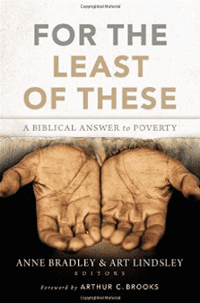 An article, “To the Poor, Poverty is More Than Material,” posted on the Institute for Faith, Work, and Economics's website lifted an excerpt from a multiauthor volume called For the Least of These: A Biblical Answer to Poverty. The lengthy quote comes from Peter Greer's essay, “A Call to Compassionately Move Beyond Charity.” I was impressed by the reflection on how the poor view themselves and it reminded me of Matthew's “Blessed are the poor in spirit, for theirs is the kingdom of heaven” (5:3). So many take Matthew's reference more broadly to mean those who have a good attitutde and recognize their “poverty” before God. You know, individuals who are humble and not arrogant. These interpretors make a difference between Luke's simple “Blessed are you who are poor" (6:20) and Matthew's “poor in spirit.” However, this is a rationalized, poor rich reading of Scripture that basically strips the poor out of “poor in spirit.” The excerpt from Peter Greer's essay gives us a basis for understanding that living in poverty is more than just a material matter and reminds us that the poor are indeed poor in spirit. In the 1990s, World Bank surveyed over sixty thousand of the financially poor throughout the developing world and how they described poverty. The poor did not focus on their material need; rather, they alluded to social and psychological aspects of poverty. Analyzing the study, Brian Fikkert and Steve Corbett of the Chalmers Center for Economic Development said, “Poor people typically talk in terms of shame, inferiority, powerlessness, humiliation, fear, hopelessness, depression, social isolation, and voicelessness.” The study highlights that, by nature, poverty is innately social and psychological . . . In my book, Wasted Evangelism: Social Action and the Church's Task of Evangelism, my definition of “social action” takes into consideration that those living with the effects of poverty are subject to systems and structures, that is the powers, that make poverty more than just material. Social action, therefore, is principally the means by which one group offers alterative means to an end for another group, taking action or advocating for action to address social issues and community life. Within the context of poverty, social action is not merely charity, alms-giving, or the transfer of wealth. It is actions taken to address relationships between the poor and the non-poor and, as well, the relationship between the poor, the social structures that can cause or promote poverty, and individuals or groups whose actions create those social structures. Social action is, therefore, associated with actions taken by individuals or groups on behalf of others, in particular advocating on behalf of marginalized or powerless individuals or groups whose access to the systems of power are limited or nonexistent. We must understanding that being poor is more than the lack of something material, but is living with the effects of poverty upon the whole person. This will help temper our judgments about the poor and why they are poor—and perhaps move us as Christians to relocate ourselves into the lives of the poor. This way we will experience and recognize what it is to be “poor in spirit.” Then, we might very will gain insight and appreciate why Jesus said, “Blessed are the poor in spirit, for theirs is the kingdom of heaven” (Matthew 5:3).
|
AuthorChip M. Anderson, advocate for biblical social action; pastor of an urban church plant in the Hill neighborhood of New Haven, CT; husband, father, author, former Greek & NT professor; and, 19 years involved with social action. Archives
February 2024
Categories
All
|
Pages |
More Pages |
|
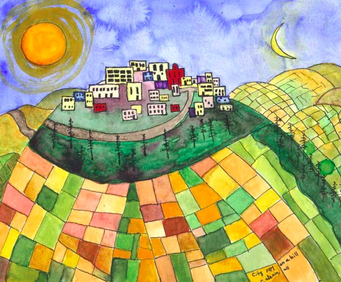


 RSS Feed
RSS Feed